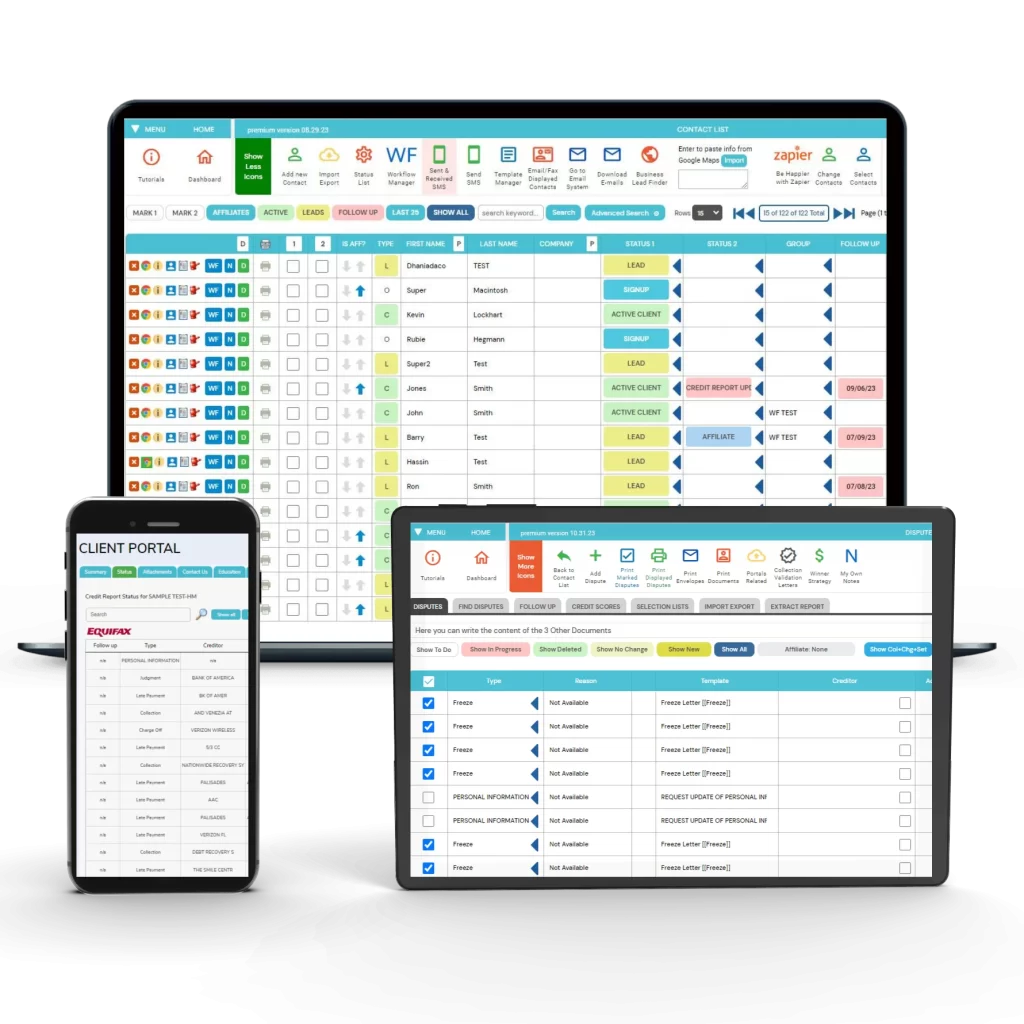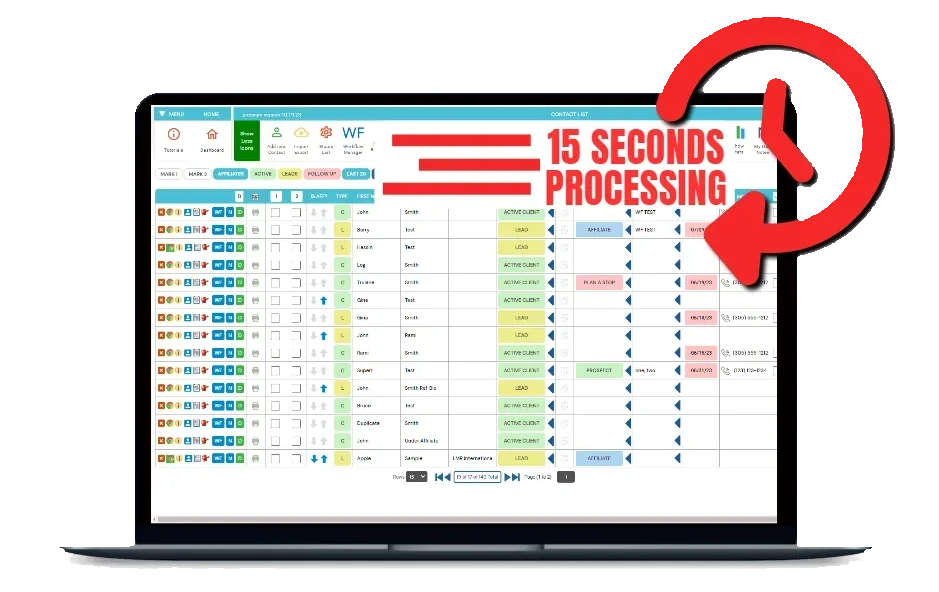CREDIT REPAIR SOFTWARE
Credit Money Machine Web or Premium

The Best Credit Repair Software Solution for Credit Repair Businesses
We Developed the First and Fastest Credit Repair Software of the Industry
As Seen On 


We Offer the Most Complete Automatic
Credit Repair Software for Business
with Integrated AI Templates
Our business credit repair software has all the tools you need to operate a credit repair business in one interface. It streamlines the business workflow, saving time and effort and improving efficiency and productivity. Moreover, eliminating the need to switch between different applications provides a seamless user experience and reduces the learning curve. Here are the key tools you’ll get when you use our software, which you won’t get from competitor’s software.
Enjoy the Following Programs within Our Credit Repair Software
Credit Repair AI
Experience the fastest and most advanced credit repair software for business. 1-Click 15 seconds credit repair process.
Full-fledged CRM
Efficiently track your client progress, provide timely updates, and ultimately enhance customer satisfaction and trust.
Marketing Capabilities
Target and engage potential clients more effectively, streamline your outreach process and increase lead conversion rates.
Sales Program
Leverage data-driven insights to target your leads with precision, resulting in higher conversion rates and revenue.
Transform Your Business with Cloud-Based Credit Repair Solutions
Accessible anytime, anywhere, and on any device, ensuring your business is always on the go.
Get All-in-One Credit Repair Software for Business + a FREE Credit Repair Business Course


Take your business to the next level and provide top-notch service to your clients with powerful credit repair tools and resources at your fingertips. Join the elite group of successful credit repair professionals today – Get Credit Money Machine Web!
BOOK A 10-MINUTE PRESENTATION BELOW
Book a 10-minute live demo of our 2024 Credit Money Machine Web. Experience the ultimate and most automated credit repair software solution. With our integrated Winner Strategy and 15-seconds credit repair processing, you’ll see why our credit dispute software outperforms the competition.
So, don’t waste time with other credit restoration software – see the difference yourself. Schedule your FREE demo now and discover how we can help you take your business to the next level!
![]()
This credit repair software saves me lots of headaches. I am new to the credit repair business and was trying different software to use. This is the only software that satisfies me. It’s very easy to use, even for a beginner like me. They have a bunch of tutorials that are easy to follow. I am glad I leaped to try credit money machine software.
30-Day Money Back Guarantee!
Your satisfaction is our priority. That’s why we proudly give a 30-day money-back guarantee. If you’re dissatisfied with our software within the first 30 days, simply contact us for a full refund, no questions asked.
Credit Money Machine vs Other Brands
Features |
CMM |
Other Brands |
| Automation | Fully Automated | Partially Automated |
| Speed | 15 SECONDS Processing | 30 MINUTES or more |
| Auto Detect Errors | Yes | Some |
| Auto Assigns Dispute Reasons and Types? | Yes | No |
| Auto Assigns Dispute Letters? | Yes | No |
| Auto Generate Dispute Letters | Yes | Some |
| Auto Update Statuses? | Yes | No |
| Options for Credit Report Providers | 11 | 1 |
| AI Integration | Yes | No |
| CRM | Yes | No |
| Sales Program | Yes | No |
| Marketing Program | Yes | No |
| Social Media Interaction | Yes | No |
| Workflow Manager | Yes | No |
| Automatic Prevention of Disputing Inquiries Linked to Positive Accounts | Yes | No |
| White-label Client and Affiliate Portals. Use your own logo. | Yes | No |
| Affiliate Commission Tracker | Yes | No |
| Free Mobile App | Yes | No |
| Free Credit Repair Business Course | Yes | No |
How to Repair Credit with Credit Money Machine
1-Click 15-Seconds Credit Repair Process

Step 1:
Click Extract Credit Report
Do the whole credit repair process with just one click on Credit Money Machine. Save yourself from headaches and time-consuming processes, and let the software do everything for you. From extracting and comparing credit reports from the three major bureaus (Experian, TransUnion, and Equifax), detecting errors, and generating and assigning dispute letters, reasons, and types.

Step 2:
Send the Report to The Bureaus
Send the dispute letters in behalf of your clients to the credit bureaus. Don’t forget to attached receipts and other documents as evidence to support your claims. You can set the software to remind you and your clients about the needed documents. The credit bureaus will then investigate and reply within 30 days.

Step 3:
Tract Your Progress
Keep a close eye on any changes in your or your client’s credit report and ensure that any corrections are accurately reflected. The credit restoration software automatically update statuses and credit scores as you extract new credit reports. Remember, staying engaged in this process is the key to improving credit scores.
How Does Our Credit Repair Software Works?
1-Click 15-Seconds Credit Repair Process

Our revolutionary 1-click, 15-second processing begins by seamlessly extracting credit reports from your chosen provider inside the Credit Money Machine software interface. We give you 11 providers to choose from, including IdentityIQ, MyScoreIQ, MyScore750, and others. After extracting credit reports, our credit repair AI automatically scans and detects discrepancies or errors within the extracted reports. The Credit Money Machine software then generates customized dispute letters tailored to specific dispute types and reasons with unparalleled precision. This automatic process eliminates manual intervention and accelerates the credit repair journey.
Additionally, it ensures that every dispute is accurate and efficient. Plus, it flags down inquiries that link to positive accounts to prevent mistakenly disputing them. This automation ultimately leads to faster and more impactful results for your valued clients.
We offer a 30-day trial for Credit Money Machine Web or Premium. 0% Risk.
Advantages of Using Credit Repair Software AI
Experience a sense of relief and empowerment with our Credit Repair Software AI. It’s like having a personal assistant that understands your credit woes and works continuously to rectify them. Feel the thrill as it automatically generates FREEZE letters and Personal Information Letters, saving you time and stress.
We have meticulously designed our software to be your steadfast ally. With just one click, it creates Collection Validation letters, offering you the convenience of an automated, proficient service. You’ll feel a surge of reassurance knowing you can now handle these critical aspects of your credit repair process easily and precisely.
Moreover, this powerful credit dispute software intelligently creates Discrepancies Compare tables under the Metro 2 guidelines. This feature brings confidence as it ensures accuracy and compliance. So, you’ll feel the satisfaction of having a sharp tool that meticulously merges these tables into your letters. Thus, proving you’ve got a powerhouse at your disposal.
Additionally, our automated dispute software brings comfort and confidence to the often overwhelming world of credit repair. It instills a sense of control, assurance, and tranquility. Thus, making the credit repair journey an empowering experience.
In Credit Money Machine, your needs are our top priority. Hence, we continue to provide the industry’s fastest and most complete credit repair software. Our powerful tools are meticulously crafted to make every step fast and easy. In fact, even before the AI software trend, we had already integrated the automatic credit repair process, requiring only one click.
Our credit repair software with AI integration seamlessly extracts credit reports, compares results, detects errors, and generates dispute letters. All in one click and within 15 seconds. Moreover, we integrated all the tools you need for your credit repair business.
Inclusions
Repair credit like a real professional, even if it is your first day. Aside from powerful tools, our software is packed with training and the ultimate guide to repairing credit like an expert.

Free Live Training

300+ Pages Credit Repair Business Course

Marketing Campaigns

Secured Client Portal
Free Mobile App
Introducing The Most Secured Client Portals
with Credit Money Machine
At Credit Money Machine, we understand the paramount importance of safeguarding sensitive information and ensuring the highest level of security for both you and your clients. That’s why we’ve designed our credit repair software with a distinct advantage – integrated, secure client portals.
Here’s what sets us apart from competitors:
Unparalleled Security
Unlike many credit despute software solutions that host client portals externally, putting sensitive data at risk, Credit Money Machine integrates these portals directly into your website or program. This means your clients’ confidential information stays under your control – right where it should be.
Reduced Risk
External client portals can be vulnerable to data breaches and identity theft. By using our integrated portals, you significantly reduce the risk of security breaches, ensuring that your clients’ trust and information remain intact.
Enhanced Privacy
We prioritize your clients’ privacy. Our integrated client portals are designed to provide access to essential information without exposing sensitive data. You can rest easy knowing that personal information is kept secure within your own environment.
Seamless Experience
With our integrated approach, your clients enjoy a seamless, branded experience. Your website or program remains the central hub for all their interactions, enhancing their trust in your services.
Your clients deserve the best in data security, and Credit Money Machine delivers just that. Choose the credit repair software with highly secured client portals for a worry-free, efficient, and trustworthy credit repair experience.

Ready to Experience the Difference?
Get a 30-Day Trial of CMM Web or Premium
Schedule a live presentation today to see how Credit Money Machine can transform your credit repair business. Your clients’ privacy and peace of mind are worth it.
We understand that repairing credit can be overwhelming,
so we simplify the process with these features:
- 15-Second Client Processing (unique in the industry)
- One-Click extraction from 123IDScore, Identity IQ, MyScoreIQ, MyFreeCreditScore, Privacy Guard, SmartCredit, and others.
- Automatic Assignment of Letters, Reasons, and Dispute Types
- Automatic Creation of Freeze and Personal Information Letters
- Easy selection of derogatory items to dispute. Global changes and much more
- 10 Secondary Bureaus to Freeze Letters, but you can add more with ease
- Automatic Creation of Validation Letters for Collections Agencies
- Create Personal Info Letters Automatically
- Automatic Comparison and Table of Discrepancies among Equifax, Experian, and Transunion for Collections, Charge-Off, Settle Accounts, and Repossessions
- Automation of Multiple Metro 2 Rounds
- History of Disputing and Communications with Bureaus and Creditors Maintained forever (always know at a glance what you did and when)
- Automatic Updates of Statuses (Deletions, No Change, Ignore, etc.)
- Automatic Prevention of Disputing Inquiries Linked to Positive Accounts
- Template Manager (use your own letters if you like)
- Create Templates (Letters & Marketing Campaigns, and much more) with Artificial Intelligence
- Integrated Outsourcing Provider Capabilities
- Workflows
- Virtual Funnels
- Email System (send & receive)
- SMS, full-fledge CRM
- Invoice System, Task Manager
Important notice: Whether you’re managing your credit repair or assisting others in the process, understanding the Fair Credit Reporting Act (FCRA) and Credit Repair Organizations Act (CROA) is crucial. These Acts ensure accurate credit reporting and regulate credit repair organizations to prevent deceptive practices, collectively safeguarding consumers in the credit repair journey.

30-Day Money Back Guarantee!
Your satisfaction is our priority. That’s why we proudly offer a 30-day money-back guarantee. If you’re dissatisfied with our software within the first 30 days, simply contact us for a full refund, no questions asked.
We offer a 30-day trial for Credit Money Machine Web or Premium. 0% Risk.
Explore Our Range of Tailored Credit Repair Software Solutions
Whether you’re an individual wanting to take control of your personal credit repair journey, a credit repair business start-up, or an established company, we have the perfect solution for you.
Personal Credit Repair Software
Our Personal Credit Repair Software empowers individuals to reclaim financial control and build a brighter future.
- 1 User
- For personal use
- Allows 3 active users
- No monthly fees
Credit Money Machine Web
Our Web version caters to medium to large-scale enterprises, providing a robust platform for efficient credit restoration.
- 3 User
- Up to 1000 Active Clients
- Unlimited Leads
- Unlimited Affiliates
Credit Money Machine Lite
For start-ups seeking a streamlined approach, our Lite version offers the essential tools to kickstart your credit repair endeavors.
- 1 User
- Up to 300 Active Clients
- Unlimited Leads
- Unlimited Affiliates
Credit Money Machine Premium
Our Premium edition offers a powerful, scalable solution for businesses with unlimited client demands, ensuring you can serve your clientele without limits.
- 6 Users
- Unlimited Clients
- Unlimited Leads
- Unlimited Affiliates
We offer a 30-day trial for Credit Money Machine Web or Premium. 0% Risk.
Why Us?

We offer a 30-day trial for Credit Money Machine Web or Premium. 0% Risk.
Credit Money Machine is the first credit repair software in the industry. Continuously helping individuals and businesses fix credit for over 30 years. Our dedication to research and development has helped us create the fastest and best credit repair software that helps people and businesses fix credit fast and with ease. We always aim to provide credit repair software that allows you to do all you need in one interface.
Moreover, our credit dispute software allows you to easily process clients, extract data from multiple sources, automatically create letters, detect errors, compare results from different credit bureaus, and more. Our software is perfect for personal use or credit repair specialists looking to grow their businesses.
Additionally, we designed our three business credit repair software to make your life easier. Not only does it have all the important tools to fix credit, but it also includes an integrated CRM system with sales and marketing capabilities. Thus, you can easily manage your clients, track their progress, and market your services to potential customers from one place.
Choose Credit Money Machine and experience the benefits of fixing credit with less effort and helping others improve their financial statuses. Fixing credit score should not be complicated. We strive to provide the most efficient and user-friendly credit repair software for consumers and credit repair companies.
Customers Testimonials:
![]()
I wish I had this software years ago. It removes so much weight from our workload. It automatically extracts dispute letters from different credit report providers with just one click. It also generates dispute letters and automatically chooses dispute reasons, making work a lot easier and faster. I love that it is integrated with a CRM program as we have to use a different program along with the software that we used before to do the work. Kudos to this amazing credit repair software!
![]()
Super easy to use, time saver, and reliable. If you are looking for handy credit repair software that has everything you need, this is what you are looking for—highly recommended!
![]()
I have been in the industry for about 25 years now. I have been using credit money machine for many of those years. It is by far the best software for our industry, and I couldn’t recommend a more powerful one than CMM.
![]()
Great Software! No Frills! Everything you need nothing you dont! The bonus is the unlimited clients which the competition does not offer!!!!
Try The Best Credit Repair Software
Professionals Have Trusted for Over 30 years.
We provide the fastest credit repair software solutions for consumers and credit repair businesses on any scale.
We offer a 30-day trial and money-back guarantee for Credit Money Machine Web or Premium


